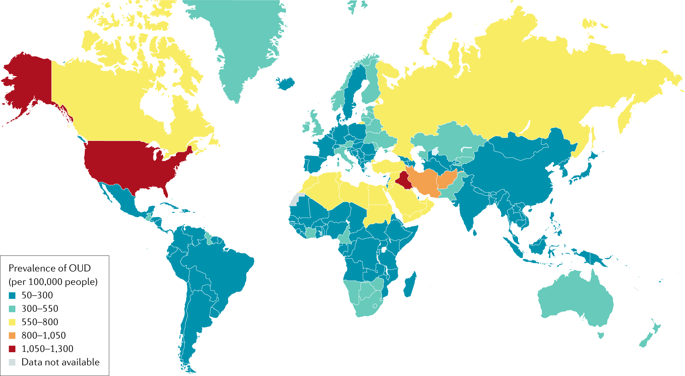当前位置:
X-MOL 学术
›
Nat. Rev. Dis. Primers
›
论文详情
Our official English website, www.x-mol.net, welcomes your
feedback! (Note: you will need to create a separate account there.)
Opioid use disorder.
Nature Reviews Disease Primers ( IF 76.9 ) Pub Date : 2020-01-09 , DOI: 10.1038/s41572-019-0137-5 John Strang 1, 2 , Nora D Volkow 3 , Louisa Degenhardt 4 , Matthew Hickman 5 , Kimberly Johnson 6 , George F Koob 7 , Brandon D L Marshall 8 , Mark Tyndall 9 , Sharon L Walsh 10
Nature Reviews Disease Primers ( IF 76.9 ) Pub Date : 2020-01-09 , DOI: 10.1038/s41572-019-0137-5 John Strang 1, 2 , Nora D Volkow 3 , Louisa Degenhardt 4 , Matthew Hickman 5 , Kimberly Johnson 6 , George F Koob 7 , Brandon D L Marshall 8 , Mark Tyndall 9 , Sharon L Walsh 10
Affiliation

|
Opioid use disorder (OUD) is a chronic relapsing disorder that, whilst initially driven by activation of brain reward neurocircuits, increasingly engages anti-reward neurocircuits that drive adverse emotional states and relapse. However, successful recovery is possible with appropriate treatment, although with a persisting propensity to relapse. The individual and public health burdens of OUD are immense; 26.8 million people were estimated to be living with OUD globally in 2016, with >100,000 opioid overdose deaths annually, including >47,000 in the USA in 2017. Well-conducted trials have demonstrated that long-term opioid agonist therapy with methadone and buprenorphine have great efficacy for OUD treatment and can save lives. New forms of the opioid receptor antagonist naltrexone are also being studied. Some frequently used approaches have less scientifically robust evidence but are nevertheless considered important, including community preventive strategies, harm reduction interventions to reduce adverse sequelae from ongoing use and mutual aid groups. Other commonly used approaches, such as detoxification alone, lack scientific evidence. Delivery of effective prevention and treatment responses is often complicated by coexisting comorbidities and inadequate support, as well as by conflicting public and political opinions. Science has a crucial role to play in informing public attitudes and developing fuller evidence to understand OUD and its associated harms, as well as in obtaining the evidence today that will improve the prevention and treatment interventions of tomorrow.
中文翻译:

阿片类药物使用障碍。
阿片类药物使用障碍(OUD)是一种慢性复发性疾病,虽然最初由大脑奖励神经回路的激活驱动,但越来越多地参与驱动不良情绪状态和复发的抗奖励神经回路。然而,尽管持续存在复发的倾向,但通过适当的治疗仍可能成功恢复。OUD的个人和公共健康负担是巨大的;据估计,2016年全球有2680万人患有OUD,每年有100,000例阿片类药物过量死亡,其中2017年在美国有47,000例。进行得当的试验证明,长期使用美沙酮和丁丙诺啡的阿片类激动剂治疗具有很好的疗效。 OUD治疗的功效,可以挽救生命。阿片受体拮抗剂纳曲酮的新形式也正在研究中。一些常用的方法虽然缺乏科学可靠的证据,但仍被认为很重要,包括社区预防策略,减少危害干预措施以减少持续使用和互助小组的后遗症。其他常用方法,例如仅排毒,也缺乏科学证据。由于合并症和支持不足,以及公众和政治观点的冲突,有效的预防和治疗对策的交付通常会变得很复杂。科学在通知公众态度和开发更全面的证据以理解OUD及其相关危害,以及获取今天将改善明天的预防和治疗干预措施的证据方面发挥着至关重要的作用。
更新日期:2020-01-09
中文翻译:

阿片类药物使用障碍。
阿片类药物使用障碍(OUD)是一种慢性复发性疾病,虽然最初由大脑奖励神经回路的激活驱动,但越来越多地参与驱动不良情绪状态和复发的抗奖励神经回路。然而,尽管持续存在复发的倾向,但通过适当的治疗仍可能成功恢复。OUD的个人和公共健康负担是巨大的;据估计,2016年全球有2680万人患有OUD,每年有100,000例阿片类药物过量死亡,其中2017年在美国有47,000例。进行得当的试验证明,长期使用美沙酮和丁丙诺啡的阿片类激动剂治疗具有很好的疗效。 OUD治疗的功效,可以挽救生命。阿片受体拮抗剂纳曲酮的新形式也正在研究中。一些常用的方法虽然缺乏科学可靠的证据,但仍被认为很重要,包括社区预防策略,减少危害干预措施以减少持续使用和互助小组的后遗症。其他常用方法,例如仅排毒,也缺乏科学证据。由于合并症和支持不足,以及公众和政治观点的冲突,有效的预防和治疗对策的交付通常会变得很复杂。科学在通知公众态度和开发更全面的证据以理解OUD及其相关危害,以及获取今天将改善明天的预防和治疗干预措施的证据方面发挥着至关重要的作用。











































 京公网安备 11010802027423号
京公网安备 11010802027423号